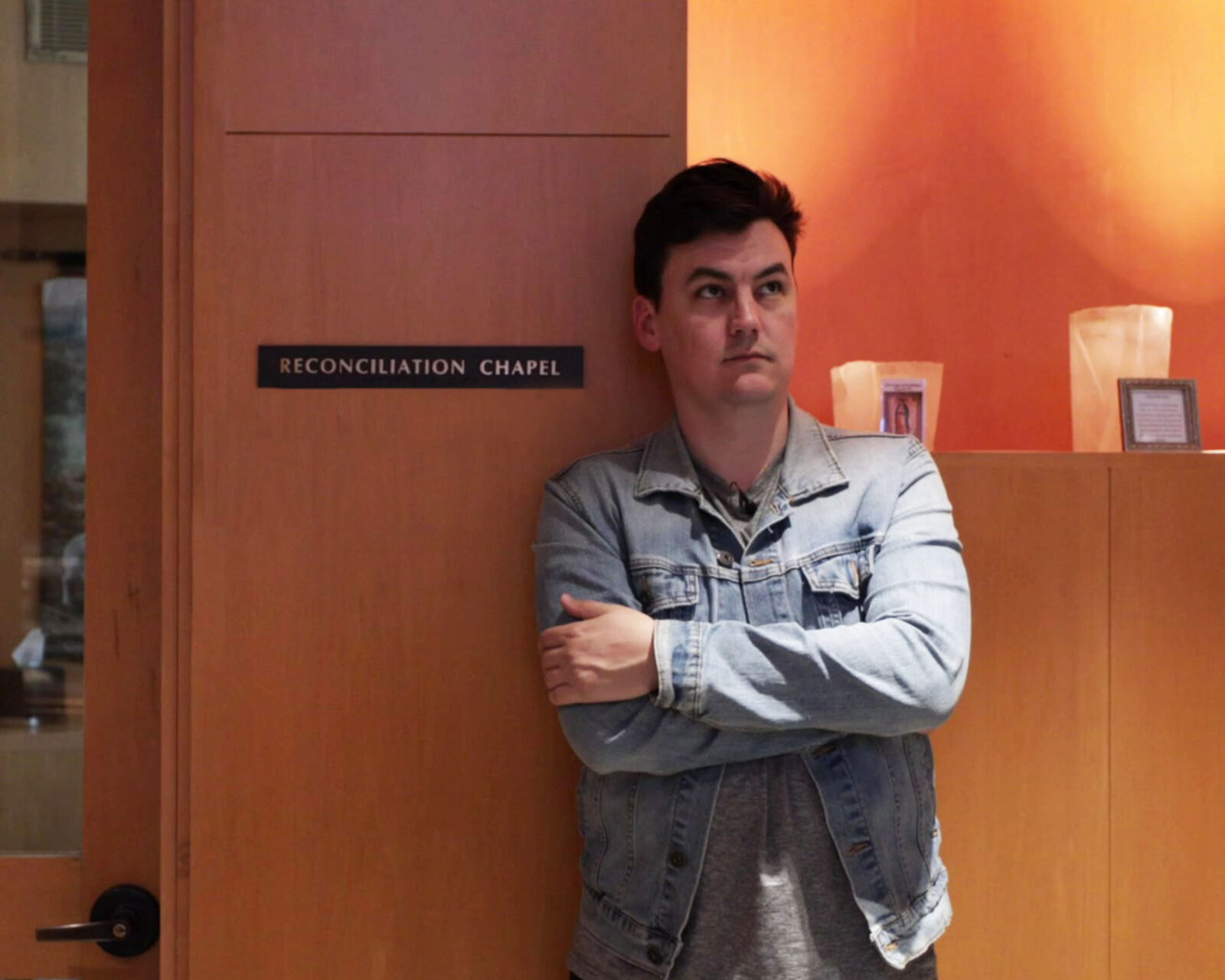Where does guilt come from?
Proclamation

Is Catholic guilt real? How should we respond when we feel guilty?
WatchTalking to Jesus, inviting the Holy Spirit into our hearts, and making an Examination of Conscience are great ways to get our hearts ready.
Proclamation

Is Catholic guilt real? How should we respond when we feel guilty?
WatchExplanation

When you feel prompted by the Holy Spirit, don’t be afraid to seek healing and forgiveness through the Sacrament of Penance.
WatchConnection

Jesus wants us to experience his mercy through his priest who exercises the power of forgiveness that Christ gave the Church in the Sacrament of Penance.
WatchEdmund: You know, you’ve probably seen confession in movies.
Actor 1: Offer me your confession.
Actor 2: I (unintelligible) murder once. I ate me on Friday once.
Actor 3: Wait a minute. Can you back up a little bit and say that again?
Actor 4: It’s been too long since my last confession. My dad used to come to this church back when I was a kid.
Actor 5: Uh, well, I, I should mentioned that I’m Jewish.
Actor 6: That’s no sin. Oh, good
Edmund: There’s a lot of times where they’ll show people actually in a confessional booth, but I always thought it was interesting that they never actually show people preparing for confession. They’ll show people waiting in line, but you don’t really see what it’s like to prepare to actually go to confession. But preparation for the Sacrament of Reconciliation is actually a really big part of the sacrament. It’s a beautiful part. And God wants to help us prepare to receive the Sacrament of Reconciliation. The Sacrament of Reconciliation is not only a sacrament where we receive God’s mercy and forgiveness, but it also strengthens our relationship with Jesus Christ. And by preparing and entering into the sacrament as fully as possible, it can actually become a beautiful moment of personal encounter with Jesus Christ. And you can experience this. Jesus wants to encounter you in the Sacrament of Reconciliation. You see, when we’re inviting the Holy Spirit into our prayer before this sacrament, the Holy Spirit’s able to gently guide us to feel sorrow for our sins and also to feel conviction to avoid this sin in the future. The Holy Spirit can also help give us the courage to confess our sins, especially when we’re tempted to be ashamed of what we’re about to confess. Okay, so I’ve been saying that the Holy Spirit can help convict us of sin, but I wanna be more clear about what that word conviction actually means, because conviction is not the same as condemnation. Okay, so here’s what’s going on when we’re talking about conviction versus condemnation. There’s two voices trying to influence you. See, the voice of the devil is that voice that’s trying to get us to attach our sins to our identity. For example, this sounds like “you are a liar, like you are, you’re bad, you’re unlovable.” This is a voice of condemnation. But the Holy Spirit, when he convicts us, he convicts us that we’re a child of God and he reminds us of the love and mercy of the Father. And the Holy Spirit creates in us a desire to return back to God, that we want to be made right with him, to have reconciliation with him. He gives us this desire to restore the life we have with God when that’s been weakened or lost by sin, of course we can never reach perfection in this life, but we can be convicted by the Holy Spirit to rely more deeply on God’s grace and to try to avoid sin in the future. The Holy Spirit just urges us to return to the Father of Mercy and to ask him to restore our identity as a son or daughter of God. In the Gospels, when people are honest about their shortcomings in front of Jesus, he gives them the grace and strength to follow him as his disciples. So the very first thing we can do as we prepare for receiving the Sacrament of Reconciliation is just begin a conversation with Jesus to go somewhere quiet and start talking to Jesus and asking him to help guide us as we examine what ways we might have gone astray from our life as a disciple of Christ. We can ask the Holy Spirit to come and help reveal our sins to us. Now, this isn’t as bad as it sounds. The Holy Spirit is a gentle, loving presence that wants to open our minds and our hearts to see our sinfulness. Okay, so hear me out. When we prepare ourselves for the Sacrament of Reconciliation, we can make what’s called an Examination of Conscience. And I know that might sound like an exam, but hear me out. An examination of conscience is when we ask the Holy Spirit to help us examine our conscience and to enlighten it, and to help us in our ability to recognize ways in which we’ve fallen short of what God’s calling us to and the ways in which we’ve sin. Now, this isn’t to condemn us, but it’s so that we can bring those parts, bring those sins and flaws and weaknesses and failures to God, and he can offer us forgiveness and mercy. So it’s an opportunity to sit down and really think about where in your life do you need more of God’s grace and mercy and forgiveness. Now, if we’re gonna be examining our conscience, we should have an informed conscience. And luckily we can better inform our conscience by reading the Bible or reading the Catechism, especially the third pillar of the Catechism on the Christian life or morality. I mean, even watching these Real+True videos is helping inform your conscience. The third pillar of the Catechism walks through the 10 Commandments. And so it’s really helpful to walk through the 10 Commandments to inform our conscience before we’re about to enter into the Sacrament of Reconciliation. Now in this pillar on the Catechism, it will help explain that there is a difference between mortal and venial sins. We need to confess mortal sins in order to be forgiven. And while it’s not strictly necessary for us to confess venial sins in confession, the Church highly recommends it because of how helpful it is for us to go through that process. And again, this is to invite God’s grace and forgiveness even into the small areas of our lives where we’ve fallen short of what God’s calling us to do. But just remember that the Holy Spirit is gentle with us and we should invite him to help us prepare for the Sacrament of Reconciliation. He wants us to return to the Father of Mercies and to receive forgiveness. And in this way, God offers us restored life through the Sacrament of Reconciliation when that life is weakened or lost by sin.
U.45 — CCC 2828-2837

By understanding this part of the Mass, you’ll be inspired to take prayer beyond the pews and into everyday acts of love and intercession.
WatchU.44 — CCC 2822-2827

Jesus shows us how to face it with trust and prayer. Learn how to pause, be honest with God, and surrender with confidence.
WatchU.43 — CCC 2816-2821

This powerful petition is a cry of hope and an invitation for God’s reign to transform both the world and our hearts.
WatchU.42 — CCC 2807-2815

What does it truly mean to live in the name of Jesus? Learn from the martyrs.
WatchBy submitting this form you consent to receive emails about Real+True and other projects of OSV.